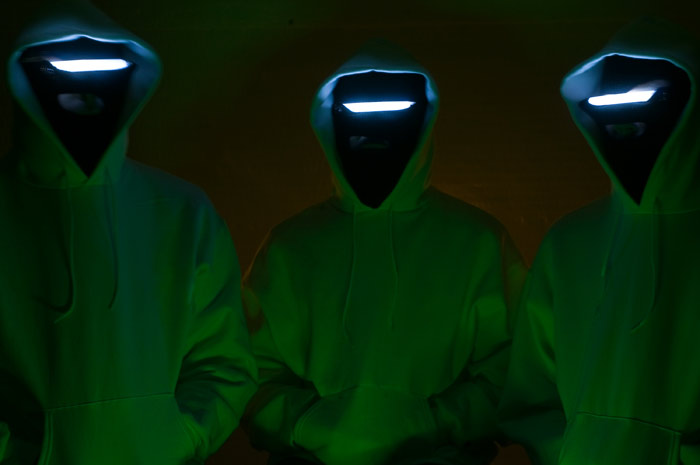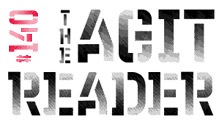
Feel It All Around
by Kevin J. Elliott
As pretentious as it seems for Akron/Family to title their latest album Self-Titled II: The Cosmic Birth and Journey of Shinju TNT, it begins to make sense once the enormous peaks and valleys of their music unfold widescreen in front of your eyes. The band has spent nearly a decade experimenting in folk, psych and sampled soundscapes, but Cosmic Birth explodes like the landmark record every band strives to make. It’s a sprawling epic that finds the trio creating from one unified and concentrated mind. During their amorphous live shows, it’s not uncommon for Seth Olinsky, Dana Janssen and Miles Seaton to constantly switch roles between the myriad instruments littering the stage. In speaking with Seaton, it’s apparent that Cosmic Birth was recorded with much of the same communal execution. While Akron/Family was once thought of as merely understudies to Michael Gira (Swans), or maybe a poor man’s Animal Collective, the new album should debunk any preconceived notions regarding the group’s mission. There’s plenty of evidence that Cosmic Birth was a clean slate for the trio or a reset freeing them to be overly loud, increasingly complex with their arrangements, and wildly ambitious. Unfortunately, in this day and age, ambition is often seen as indulgence. But while Cosmic Birth’s ingredients reflect the prog pomp of King Crimson, the mellifluous intricacies of British folk and the boho-mysticism of the Grateful Dead, not a decibel or note seems wasted on the record. If more bands were to adopt the exercise Seaton and the band refer to as “groupthink,” the world would be a much better place and ambition wouldn’t be such a dirty word.
So why have you chosen to title this album Self-Titled II? Is this a continuation of your very first record or of the same spirit?
Miles Seaton: It was more a desire for us to get back to the intimacy and the recording principles that we established with the very first record. It felt like we were starting fresh and having this new experience with one another and our music. There was a level where it felt magical and like the first time we ever recorded. Plus we actually sampled a lot of stuff from our first record.
Have you recorded with Chris Koltay before? What did he bring to the table? The sound on this record is louder and more intense than anything you’ve done in the past.
MS: We did the last record with him, so we knew what to expect and what we wanted to do. There was a conscious choice on our part to use a lot less layering. There’s a lot more space that’s been pushed a lot harder as far as volume is concerned. There’s a whole lot of distortion that comes with everything being smashed. It created a lot of color and harmonics in the overtones of the record. We knew that Chris was the guy who could get that sound for us.
Did being in Detroit provide any kind of inspiration in recording the record?
MS: Oh yeah, it’s an incredible place. There’s a lot of fantastic history there. The feeling of that city is almost Mad Max. It’s got a post-apocalyptic atmosphere with nature reclaiming the landscape through the bones of the crumbling architecture. It’s a very poetic place in my opinion. It was summer then and very beautiful, and we were riding bicycles on the interstate.
In the press release it claims these songs are “relics of a new tomorrow” and that “these are new beginnings.” Can you elaborate any more on the meaning of that?
MS: All of us are in a place where we’re starting to discover a new stride in the future of our music. This record—the process of envisioning it and the feeling around it—we discovered a lot about ourselves and how exciting music can be. That wording is part of the whole mythic, poetic language of how we are describing our music and how we engage with it. All of us have made a conscious effort to not drain the magic out of the process of creating music together. We are honoring that, not worrying about being cheesy, and realizing how precious this musical process is to us. We don’t want to be the guys who just say, “Yeah, play in a band.” That’s fine if you want to write your story like that as a musician, but that’s not the story I want to live in.
So then is there an overarching concept to Cosmic Birth? Is there a story that aligns it all that needs explanation?
MS: Not particularly, but it is the story of us becoming super inspired and envisioning a truly wild and boundless way of creating music, which all of us strove to accomplish. When we were planning the record there was a lot of writing, sending pictures, recording strange sounds and sending those things back and forth between us. We were making huge dream boards where we were trying to tie all of those things together as a “groupthink,” as Seth likes to call it. Some of it comes out abstract and poetic and then some of it is more just imagery and the idea of rebirth. The character of Shinju TNT, he kind of represents that idea and he just sort of appeared to us out of the ether one hyper-caffeinated afternoon.
The record is certainly an ambitious undertaking. I’m curious to know how you will take Cosmic Birth out on the road. You are well known as a particularly enthralling live band, so how will these songs affect the shows?
MS: We’ve always tried to keep the music moving in the concept of a tour. The top-half of the show has been the rock stuff from this album, and it has been pretty rocking, pretty heavy. We’re trying to be more high energy and trying to be more concise. We’re also trying to incorporate some of the really early stuff into that mix. But I feel like this time around, with all of the rock stuff we’ve been doing, it’s almost punk because there’s a very excitable quality to what we are doing currently.
